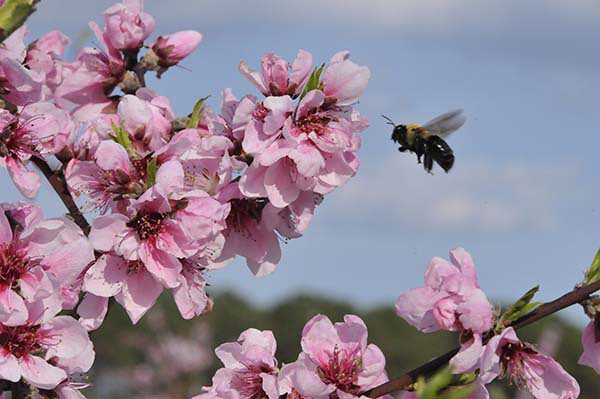CLEMSON — A host of South Carolina state agencies have teamed up to develop a new certification program that teaches how to create pollinator habitat at solar farms.
The Certified Solar Pollinator Habitat program is a collaboration between the Department of Fertilizer Regulation and Certification Services (FRCS), South Carolina Department of Natural Resources (SCDNR), Clemson University Extension Service and Audubon South Carolina.
The program provides a framework to encourage the planting and maintenance of pollinator habitats at solar farms in South Carolina. Applications for the program are being accepted now, and the registration deadline is Feb. 22. Program information can be found at https://bit.ly/3iwnTgq.
“Currently, the most common practice for established solar sites is to plant grasses, which have to be mowed. By planting low-height plant species to attract pollinators, solar sites can provide food and cover for bees, butterflies, moths, birds and more, which can provide benefits to the agricultural community by pollinating crops. The establishment of these plant species will also help with erosion control,” said Sarah Wilbanks, Assistant Director of Clemson University’s Fertilizer Regulatory and Certification Services
The Certified Solar Pollinator Habitat program offers training for environmental consultants, utilities, solar developers and landowners. Led by Clemson Extension, the training will focus mainly on how to establish pollinator plant species and manage them within a solar farm.
Solar power generation has grown significantly in South Carolina. The 2019 Smart Electric Power Alliance Utility Solar Market Report states that 571.3 megawatts of solar energy is online in South Carolina. In 2017, according to the Smart Electric Power Alliance, South Carolina was fourth in the country in new solar capacity per state, following behind California, Texas and North Carolina.
The increase in solar generation creates land use competition on the landscape with traditional land uses, such as agriculture and silviculture. Solar farms can also adversely affect valuable natural resources if they are not properly planned and constructed.
Spurred by an initiative of Audubon South Carolina with the support of SCDNR, the South Carolina Solar Habitat Act (§50-4-10) was signed into law by Gov. Henry McMaster, taking effect on June 1, 2018. The law provides a voluntary framework to encourage owners of ground-mounted commercial solar energy generation sites to follow voluntary site management practices that both provide native perennial vegetation and foraging habitats beneficial to gamebirds, songbirds and pollinators and also reduce stormwater runoff and erosion at the solar generation site.
Sites will be inspected by FRCS two years after establishment and deemed certified if they pass set standards for plant diversity, native plant species, number of flowering plants, and noxious-weed and exotic weed free among others.
[END]

